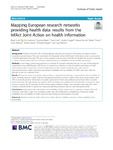2022-01-10Zeitschriftenartikel
Mapping European research networks providing health data: results from the InfAct Joint Action on health information
Unim, Brigid
Haverinen, Elsi
Mattei, Eugenio
Carle, Flavia
Faragalli, Andrea
Gesuita, Rosaria
Thissen, Martin
Abboud, Linda
Grisetti, Tiziana
Bogaert, Petronille
Palmieri, Luigi
Background:
Research networks offer multidisciplinary expertise and promote information exchange between researchers across Europe. They are essential for the European Union’s (EU) health information system as providers of health information and data. The aim of this mapping exercise was to identify and analyze EU research networks in terms of health data collection methods, quality assessment, availability and accessibility procedures.
Methods:
A web-based search was performed to identify EU research networks that are not part of international organizations (e.g., WHO-Europe, OECD) and are involved in collection of data for health monitoring or health system performance assessment. General characteristics of the research networks (e.g., data sources, representativeness), quality assessment procedures, availability and accessibility of health data were collected through an ad hoc extraction form.
Results:
Fifty-seven research networks, representative at national, international or regional level, were identified. In these networks, data are mainly collected through administrative sources, health surveys and cohort studies. Over 70% of networks provide information on quality assessment of their data collection procedures. Most networks share macrodata through articles and reports, while microdata are available from ten networks. A request for data access is required by 14 networks, of which three apply a financial charge. Few networks share data with other research networks (8/49) or specify the metadata-reporting standards used for data description (9/49).
Conclusions:
Improving health information and availability of high quality data is a priority in Europe. Research networks could play a major role in tackling health data and information inequalities by enhancing quality, availability, and accessibility of health data and data sharing across European networks.
Dateien zu dieser Publikation

